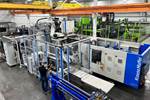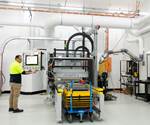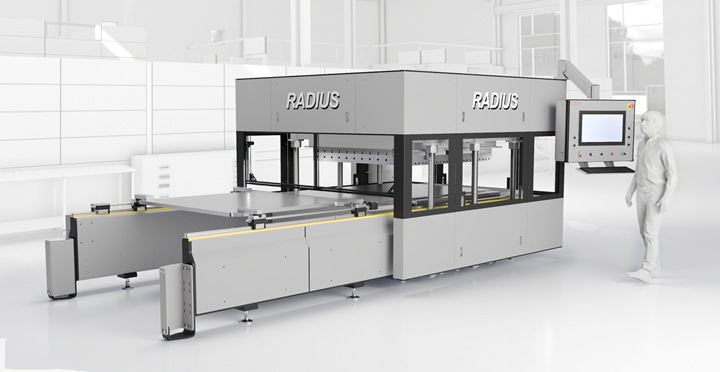Radius Engineering supplies NIAR with thermoplastic consolidation workcell
NIAR ATLAS facility will use the workcell to produce precisely consolidated laminates for thermoplastic aerospace structure process strategy development.
Radius Engineering (Salt Lake City, Utah, U.S.) has been selected by the National Institute for Aviation Research (NIAR) at Wichita State University (Wichita, Kan., U.S.) to supply a thermoplastic consolidation workcell to its Advanced Technologies Lab for Aerospace Systems (ATLAS) facility.
The Radius thermoplastic consolidation workcell installation will provide ATLAS researchers and engineering students with precisely consolidated laminates. These laminates will be used to develop processing strategies for next-generation thermoplastic aerospace structures for NIAR and its industry partners. ATLAS, a multi-disciplinary manufacturing environment and engineering education program, aims to provide a neutral ground for advanced manufacturing research and development (R&D) with state-of-the-art machines, software and processing options.
The Radius Engineering workcell provides up to 350 tons of clamping force with the company’s distributed pressure system (DPS). According to Radius, the workcell DPS will provide evenly distributed consolidation pressure for optimal laminate quality over an area of 4 × 4 feet (1.2 × 1.2 meter). The DPS delivers precise laminate consolidation pressures from 50-300 psi (3.5-21 bar) within a tolerance of ±5 psi (±0.3 bar) throughout the full operating range, on variable laminate sizes. The workcell includes an integrated temperature control system with programmable heating and cooling rates to a maximum operating temperature of 800°F (426°C). Radius’ proprietary Insights Software provides intuitive programming controls along with data collection and analysis tools that are Industry 4.0 compatible.
Radius, an AS9100D-certified equipment and service supplier, delivers net-shape composites manufacturing capability by providing tooling, equipment and know-how. It leverages its knowledge as a composites processing expert, backed by 35 years of experience, to develop customizable machines and turnkey workcells that provide high levels of performance for the processing of aerospace-quality composites.
Related Content
-
Plant tour: Joby Aviation, Marina, Calif., U.S.
As the advanced air mobility market begins to take shape, market leader Joby Aviation works to industrialize composites manufacturing for its first-generation, composites-intensive, all-electric air taxi.
-
TU Munich develops cuboidal conformable tanks using carbon fiber composites for increased hydrogen storage
Flat tank enabling standard platform for BEV and FCEV uses thermoplastic and thermoset composites, overwrapped skeleton design in pursuit of 25% more H2 storage.
-
JEC World 2024 highlights: Thermoplastic composites, CMC and novel processes
CW senior technical editor Ginger Gardiner discusses some of the developments and demonstrators shown at the industry’s largest composites exhibition and conference.














